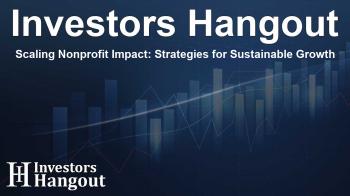Scaling Nonprofit Impact: Strategies for Sustainable Growth

Scaling Nonprofit Impact: Strategies for Sustainable Growth
Two new insightful articles from The Bridgespan Group explore how nonprofits and NGOs can effectively tackle social issues on a larger scale while avoiding the pitfalls of rapid organizational growth. The research revisits ideas first presented in Bridgespan's earlier work, emphasizing the necessity for nonprofits to adapt and thrive in a changing environment.
Key Findings from the Latest Research
The first article, titled A New Look at Strategic Pathways for Solving Social Problems at Scale, examines the strategies employed by 80 mission-driven organizations, with a notable two-thirds of them operating beyond the US borders. Through interviews with organizational leaders and a comprehensive analysis of prevailing sector trends, the report uncovers eight pathways that nonprofits utilize to amplify their impact without compromising their operational sustainability.
Co-author Marina Fisher, a partner at Bridgespan, expresses hope that the research will serve as a practical guide for nonprofit leaders. "Our findings highlight that there isn’t a one-size-fits-all solution; nonprofits must align their scaling strategies with their strengths, the nature of the social issues they address, and the wider ecosystem involved in social change," she explains.
Three Strategic Approaches
The research categorizes the eight pathways into three main strategic approaches:
- Spreading a Solution: This involves empowering other organizations with validated models or providing direct access to solutions to the public.
- Changing Enabling Conditions: Here, the focus is on influencing public policies, business practices, and societal perceptions to encourage systemic change.
- Cultivating Coordinated Action: This approach emphasizes mobilizing coalitions, offering shared infrastructure support, and enabling communities to drive self-directed change.
Essential Questions for Nonprofit Leaders
The second article, Three Questions for Nonprofits That Want to Solve Social Problems at Scale, poses critical strategic questions that nonprofit leaders need to consider to maximize their impact:
- What is the highest-impact role our organization can play? Understanding one’s unique contribution within the broader landscape of social change is vital. For instance, organizations like HealthySteps and Tenure Facility exemplify how aligning expertise with systemic needs can significantly enhance impact.
- What capabilities and structures are needed to succeed? Scaling effectively often requires investment in essential capabilities, such as policy advocacy and coalition-building, with organizations like Global Fishing Watch and Educate Girls showcasing successful growth strategies.
- How can organizations continuously learn and adapt? The dynamic nature of social and political conditions mandates that organizations remain agile. Continuous measurement, collaboration, and an innovative spirit are crucial for maintaining sustained impact over time.
The Importance of Perseverance in Nonprofit Work
The challenges faced in nonprofit work are not trivial, as acknowledged by Bridgespan Manager and report co-author Alyson Zandt. She points out, "What makes these questions so essential is that they compel leaders to navigate tradeoffs and tensions regularly. The organizations that succeed share a common trait: resilience. Tackling social issues at scale is an enduring endeavor, and sometimes perseverance is the most significant asset a nonprofit can possess."
Understanding the Role of Bridgespan
The Bridgespan Group is a global nonprofit committed to collaborating with social change organizations, philanthropists, and impact investors. The organization aims to promote equity and justice through various services, including strategy consulting and research. By learning from its engagements, Bridgespan identifies and disseminates innovative practices and ideas to support the social sector.
With offices located in various cities across the globe, Bridgespan implements strategies that address the pressing needs of communities, reinforcing the idea that effective social change requires collective effort and thoughtful planning.
Frequently Asked Questions
What is the primary focus of the articles from Bridgespan?
The articles focus on effective strategies nonprofits can employ to address social issues sustainably without succumbing to the pressures of rapid organizational growth.
How many organizations were reviewed in the research?
The research analyzed 80 mission-driven organizations, with a significant portion active internationally, to draw insights into their strategies for social change.
What are the three main strategic approaches highlighted?
The three strategic approaches are spreading solutions, changing enabling conditions, and cultivating coordinated action to maximize impact.
Why is perseverance important for nonprofits according to the research?
Perseverance is key as tackling social problems is often a long-term process that requires steady commitment in the face of challenges and uncertainties.
How can organizations maintain adaptability according to the findings?
Organizations can maintain adaptability through ongoing learning, collaborative efforts, and a strong emphasis on innovation amid changing social landscapes.
About The Author
Contact Kelly Martin privately here. Or send an email with ATTN: Kelly Martin as the subject to contact@investorshangout.com.
About Investors Hangout
Investors Hangout is a leading online stock forum for financial discussion and learning, offering a wide range of free tools and resources. It draws in traders of all levels, who exchange market knowledge, investigate trading tactics, and keep an eye on industry developments in real time. Featuring financial articles, stock message boards, quotes, charts, company profiles, and live news updates. Through cooperative learning and a wealth of informational resources, it helps users from novices creating their first portfolios to experts honing their techniques. Join Investors Hangout today: https://investorshangout.com/
The content of this article is based on factual, publicly available information and does not represent legal, financial, or investment advice. Investors Hangout does not offer financial advice, and the author is not a licensed financial advisor. Consult a qualified advisor before making any financial or investment decisions based on this article. This article should not be considered advice to purchase, sell, or hold any securities or other investments. If any of the material provided here is inaccurate, please contact us for corrections.

